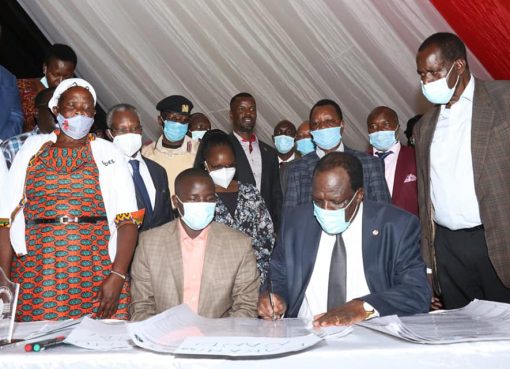The Government has finalized plans to roll out a digital platform through which at least 200, 000 small scale farmers can enlist for supply of farm inputs at affordable rates.
The National e-voucher program and the ministry’s digital strategy are set to be launched this Friday by the Agriculture cabinet secretary, Peter Munya at the Ahero Multipurpose Centre in Kisumu County.
Agriculture PS Hamadi Boga told a virtual press briefing ahead of the launch of the Evoucher Digital Programme that farmers in 12 selected pilot counties will benefit from the new system which was tailored to improve food production in the country.
He insisted that only registered farmers were eligible for the voucher to be issued by respective county government to facilitate them access seeds, fertilizer, agrochemicals and insurance from authorized agro-dealers.
Boga said the new approach commonly known as the e-voucher program falls under the National Value Chain Support Program intends to empower small scale farmers produce more and facilitate efforts to make the country food secure.
“Under the evoucher system, farmers will receive a voucher from their respective County Governments to buy farm inputs from the nearest agrodealers, who will later claim their payments from the government” he explained.
The PS said the program was part of the government’s digital agenda that was designed to improve the fertilizer subsidy program adding that at least 1.4 million farmers were targeted by the year 2023 and at least 2,300 agro-dealers will be involved in the provision of the farm inputs to the tune of Ksh 0.7 billion.
Boga underscored the critical role data and digital solutions played in agricultural production and the general livelihood and income of farmers as such information enabled them planned ahead to avert losses.
He said another point of focus was to unlock the over 500,000 acres of agricultural production land that was underutilized and encouraging farmers invest in agro-processing venture to improve the value chains..
“By upscaling and expanding its reach for better impact, whilst building on regional and local experiences and lessons learned. The e-voucher program will support agricultural production and marketing through input-subsidized agriculture using an electronic voucher input management system. This will be achieved through input subsidy support & incentives including seeds, agrochemicals, extension services and, later, insurance and market-linkages,” he said.
In 2008, the government started the subsidized fertilizer program to caution farmers against high prices of fertiliser and also help in improving productivity. But over the years, unscrupulous traders colluded with officials at the National Cereals and Produce Board to buy the subsidy fertiliser, and could repackage it and then sell back to farmers at a higher price.
The launch comes after the government in November 2018 proposed to use e-vouchers for farmers to buy subsidized fertilizer from private agro-vet shops, to weed out unscrupulous traders who had infiltrated the distribution chain to cash on the bureaucratic process at the time.
Timothy Njagi, a researcher from Tegemeo Institute of Agricultural Policy and Development- Egerton University expressed fears that the fertilizer subsidy program should be redesigned to make more impact to farmers and increase productivity.
Rice farmers from Ahero in Kisumu County and Mwea in Kirinyaga County will be the first beneficiary of the programme during the next planting season.
By Wangare Ndirangu




